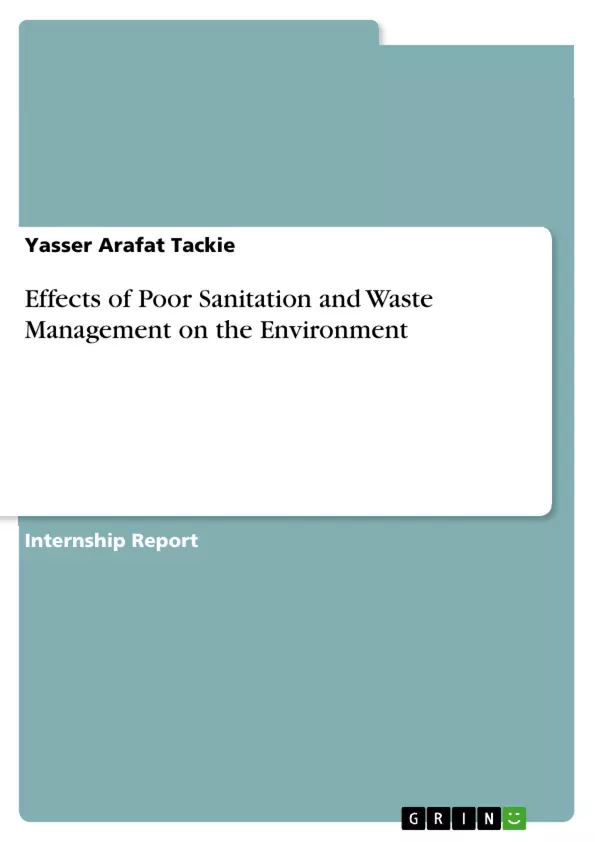The management of sanitation and solid waste is a critical aspect of modern urban living, yet its significance often goes unnoticed until environmental crises emerge. The impact of poor sanitation and inadequate solid waste management on the environment is a matter of global concern. This issue transcends geographical boundaries and affects both developed and developing nations, albeit in varying degrees. Poor solid waste management is a major contributor to environmental pollution. Improper disposal of solid waste, including plastics, metals, and hazardous materials, leads to the release of harmful pollutants into the air, soil, and water bodies . Solid waste management is a pressing environmental concern in Ghana, a developing country in West Africa, due to the exponential growth of urban centers and industrial activities in recent years. As a result, waste generation has increased significantly, leading to several environmental degradation, health, and socio-economic challenges. The lack of proper collection, recycling facilities, and public awareness campaigns has exacerbated the problem. Greater Accra, the vibrant heart of Ghana, is comprises of communities that represent a microcosm of the larger problem, each with its own unique challenges and characteristics. From the sprawling neighborhoods of Accra, the bustling marketplaces of the central business district, to the tranquil coastal community of Chorkor, which is the study area, the solid waste issue reverberates differently, yet equally impactfully, through the lives of residents. Like many fishing communities, Chorkor faces challenges such as environmental degradation, inadequate social infrastructure, air pollution and waste management infrastructure, and limited access to clean water and sanitation facilities, particularly in areas close to the sea.
Table of Contents
- Introduction
- Context of the Research
- Research Question(s)
- Social/Political/Scientific Relevance of the Research
- Study Area
- Research Methodology
- Sources of Data
- Sampling
- Techniques of Data Analysis
- Data Analysis and Presentation
- Socio-Demographic Characteristics of Respondents
- Occupational Distribution of Respondents
Objectives and Key Themes
This research aims to assess the effects of poor sanitation and solid waste management on the environment in the Chorkor community in Ghana. It seeks to identify the specific challenges faced by the community, analyze the implications of these challenges, and understand how residents cope with the situation. The study also explores the crucial link between waste management and human well-being.
- Environmental degradation due to poor sanitation and waste management
- The impact of poor sanitation and waste management on human health and well-being
- The effectiveness of current waste management practices in the community
- The role of community engagement and awareness in improving waste management practices
- Potential solutions and strategies for addressing the challenges of poor sanitation and waste management
Chapter Summaries
The research begins with an introduction highlighting the global concern over the impact of poor sanitation and waste management on the environment. It then provides context by outlining the researcher's internship with SESA Recycling Limited in Ghana. The research question focuses on how poor sanitation and waste management have affected the environment in the Chorkor community. The research also emphasizes the social, political, and scientific relevance of understanding these challenges and the importance of developing solutions.
The study area chapter provides detailed information on the Chorkor community, including its location, demographics, and socio-economic characteristics. This is followed by a description of the research methodology, which includes both primary and secondary data collection techniques. The sampling methods and data analysis techniques are also outlined.
The data analysis and presentation section focuses on the socio-demographic characteristics of the respondents and their occupational distribution. This provides valuable insights into the community's composition and economic activities.
Keywords
This research focuses on the critical issues of poor sanitation, waste management, environmental degradation, human well-being, community engagement, and sustainable development practices. The study emphasizes the need for effective solid waste management strategies in developing countries like Ghana, considering the impact of urbanization and population growth on waste generation and environmental challenges.
- Arbeit zitieren
- Yasser Arafat Tackie (Autor:in), 2024, Effects of Poor Sanitation and Waste Management on the Environment, München, GRIN Verlag, https://www.hausarbeiten.de/document/1494826


